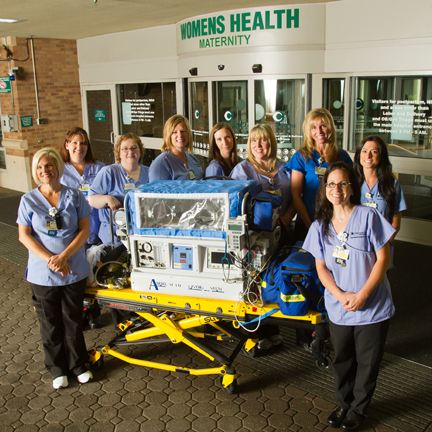NICU Transport team marks 25 years of small miracles


Although moms and dads eagerly anticipate meeting the newest member of their family, sometimes that first meeting comes with challenges. When a baby with serious health issues is born at a hospital without a neonatal intensive care unit (NICU), parents all over Delaware can count on the expertise of the Christiana Care neonatal transport team. This team — which has been busy saving newborn lives for 25 years — offers advanced care where the baby is born, or transports the baby to a hospital that offers a more advanced level of care.
Think of Christiana Care’s neonatal transport team as an intensive care unit on wheels. Established by Christiana Care Health System and the State of Delaware 25 years ago, the team’s special ambulance is equipped with the latest technologies, including mobile ventilators, incubators, monitors, IV infusion pumps, a mobile cooling blanket and all of the necessary equipment to help stabilize a baby who is sick.
The team has transported more than 7,000 infants since it was formed — more than 400 transports per year — and helps babies throughout Delaware and at neighboring hospitals in Maryland, Pennsylvania and New Jersey.
“I was the director of neonatal transport when we first established the team back in 1987,” says John L. Stefano M.D., director of neonatology, section chief, Christiana Care Health System and professor, pediatrics, Jefferson Medical College. “It is amazing to me to have witnessed the growth and capability of this program both in terms of clinical expertise and technical advancements. Mostly, however, I am overwhelmed by the dedication and esprit-di-corps of the members of the team. Nothing stops them when a baby is in need of our service. Blizzards, hurricanes, beach traffic…I mean, nothing, will impede their efforts to help a sick baby.”
The clinical team that travels with the ambulance varies depending on the needs of the newborn. The team is composed of nurses, respiratory therapists and neonatal nurse practitioners or physicians who have received advanced training in the care of critically ill newborns. Examples of conditions that require the assistance of this crucial service include prematurity, severe respiratory distress, extremely low birth weight due to preterm labor, and low blood sugar for newborns of diabetic mothers. The new cooling “blanket” provides time-sensitive therapy for infants who may be at risk for injury or long term handicaps due to lack of oxygen and blood flow to vital organs.
In some cases — a very critical baby a distance away, traffic or roadway problem, or another unusual circumstance that would make a ground transport unacceptably long — the team travels by helicopter. The helicopter is equipped with a special, lightweight incubator for these situations
For at-risk babies, a call to the transport team means expert help is quickly on the way – sometimes arriving even before the baby is born, when a mother arrives in preterm labor. Transport team members work to stabilize the baby when they arrive, work with the doctors on staff at the hospital to establish appropriate care there or continue to administer treatment while en route to the selected NICU.
“Our goal is to get to a baby where he or she is born, stabilize him or her and then, in a controlled environment, take the baby to a hospital that offers a higher level of care,” says Theresa McGreevy, coordinator and neonatal nurse practitioner for the team.
That higher level of care may be at Christiana Hospital, which has a Level III NICU and 72 available beds. The decision about where to transport each newborn is based on a combination of the baby’s condition and the family’s location. An important goal is to keep the baby as close to his or her parents as possible, considering the anxiety they experience at the prospect of being separated from their newborn.
“When one of our newborns is sick, we take it very personally,” says Nancy Oyerly, director of maternal-child health at Nanticoke Memorial Hospital, one of many Delaware hospitals served by the transport team. “We’re grateful to have the support of the team from Christiana Care. Not only do they consult with us on specific cases, but they also invest in training our staff so we can begin the process of stabilizing these special newborns while we wait for the team’s arrival. They even take the time to let us know the outcomes of the babies we entrust to their care.”
“The neonatal transport team from Christiana Care has been a godsend for thousands of babies born at outside organizations who require emergency neonatal services,” says Robin Underwood, RN MSN CNS APN, Clinical Nurse Specialist Pediatrics and NICU, Bayhealth Medical Center. “The team is not only skilled, but wonderful with families whose baby must be transported to a higher level of care. Their mix of technical expertise and compassion is unparalleled. Thank you for providing our most vulnerable patients with expert care.”
Although no parent wants to think about the worst happening with their newborn, there’s comfort in the fact that expert help from Christiana Care is one phone call away.